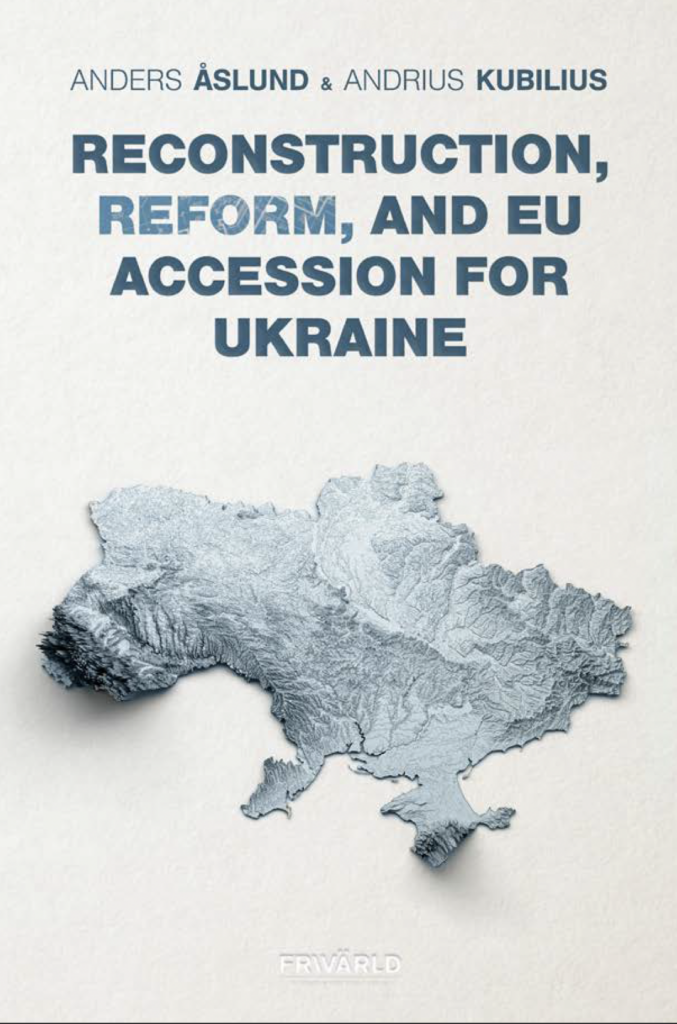
Book “The Reconstruction, Reform, and Accession of Ukraine”, co-authored by Dr. Anders Åslund and Andrius Kubilius
2023-03-22 | Expert publications, Political initiatives, EU integration, Reconstruction, Geopolitical analysisDr. Anders Åslund is a senior fellow at the Stockholm Free World Forum and an Adjunct Professor at Georgetown University. He is a leading specialist on economic policy in Russia, Ukraine and Eastern Europe. Dr. Åslund has served as an economic adviser to several governments, notably the governments of Russia and Ukraine. He has published widely and is the author of 15 books.
Andrius Kubilius is a Member of the European Parliament (MEP) and former Prime Minister of Lithuania. He is the Chair of the Delegation to the Euronest Parliamentary Assembly and member of the Committee on Foreign Affairs.
Publishing of the book was sponsored by Frivärld – Stockholm Free World Forum.
1. Introduction
Ukraine has developed greatly since it became independent on August 24, 1991. Its development has not been easy, because in Soviet times it suffered badly from repression and isolation. The KGB was always particularly focused on Ukrainian nationalism, which it correctly saw as the greatest threat to the persistence of the Soviet Union. Therefore, repression in Ukraine was arguably worse than in any other European Soviet republic. It has taken time to overcome the isolation imposed by the Soviets, but Ukraine’s democratic and economic institutions have evolved successfully.
Unfortunately, also after its independence, Ukraine has suffered severely from Russian aggression. For the first two decades, the Russian interference took the form of non-market energy deals that promoted corruption. In 2014, Russia launched open warfare. After eight years of low-intensity war in which 14,000 Ukrainians are considered to have died, Russia opted for full-scale warfare on February 24, 2022.
The Ukrainian people have bravely stood in defense of their nation and they have done so with impressive success, astounding the world. Russia’s assault on Ukraine has convinced the Ukrainians that they are one nation and that Russia is not ready to pursue peaceful cooperation with Ukraine but desires its annihilation. The European Union has drawn the same conclusion. Today, a large Ukrainian majority wants their country to become a full member of both the EU and NATO, and the EU has been greatly impressed by the Ukrainians’ commitment to European values. Therefore, realizing that Ukraine is a fully-fledged European country, the EU welcomes Ukraine. Ukraine and the EU have come to the same conclusion: they aspire to far-reaching integration with Ukraine becoming a full member of the EU.
The EU and Ukraine negotiated their Association Agreement, including a Deep and Comprehensive Free Trade Area (DCFTA) between 2007 and 2011, and they signed on March 21 and June 27, 2014.1 Ukraine has adopted broad-based reforms in line with this agreement. The Association Agreement with the DCFTA came into force in 2017. In the same year, the EU granted Ukrainians visa freedom. In June 2022, the EU took the next big step: offering Ukraine both membership perspective and to become a candidate for EU membership. The ensuing step is to start membership negotiations. These comprise a lengthy process because they involve substantial institutional reforms to the benefit of the Ukrainian nation. Therefore, on November 23, 2022, the European Parliament adopted a resolution on the new EU enlargement strategy, which demanded that the EU “establish clear deadlines for concluding negotiations with the accession countries by the end of the current decade at the latest”.
Ukraine needs to rebuild after the destruction caused by the Russian invasion. This requires substantial financing. Ideally, Russia should be forced to pay war reparations for all the damage it has caused in Ukraine. The best way of doing so is that the Western countries that have frozen a total of $300 billion of Russian Central Bank reserves confiscate them and use them as Russian war reparations for Ukraine. In any case, the West and international financial institutions also need to make substantial contributions. Hopefully, Ukraine’s further development will also attract major private investment.
At present, there is much talk about a Marshall Plan for Ukraine, which appears appropriate given the size of the undertaking and the financing needed. Since the funds required are large, it is vital that an independent international authority is set up to manage these funds in a transparent fashion because Ukraine’s foremost problems have been corruption and insecure private property rights.
Our hope is that Ukraine, and the collective West, will combine and cooperate in these three processes: reconstruction, EU accession, and the completion of Ukraine’s reforms. While we hope that the EU will be able to take a lead in this process, it is important that the United States, the United Kingdom, Canada, Japan, and other democratic countries participate. Since this is a major long-term project, we must get it right.
